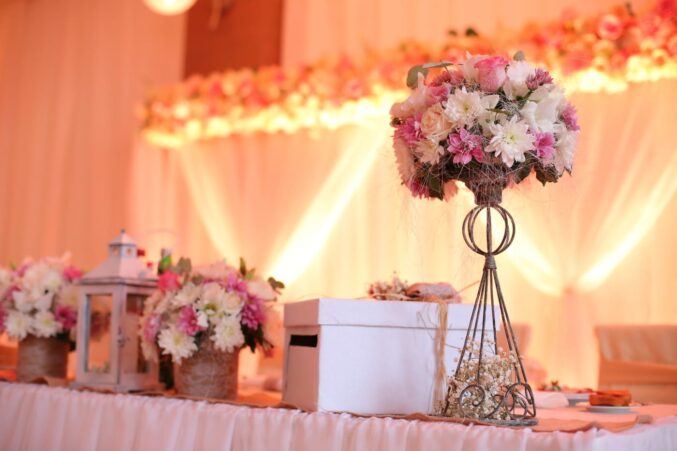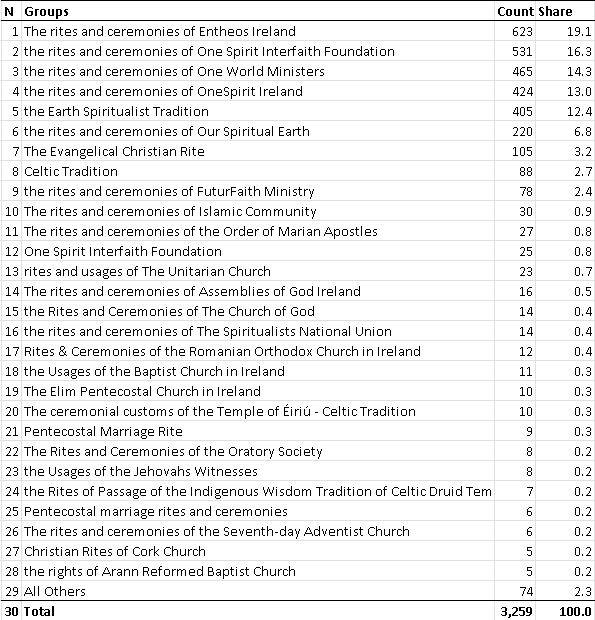While the number of Catholic marriages in Ireland is steeply declining, new data released by the Central Statistics Office (CSO) highlights the rise of ceremonies belonging to “other religious denominations”, to use the CSO’s term. Now, you might think this means Muslim ceremonies, or perhaps those that take place in African Pentecostal churches, but these account for only a tiny fraction of the total (see table below). The vast majority of the ceremonies, in fact, really belong under the very broad heading ‘New Age’. They increased from 5.3pc of the total in 2018 to 15.8pc last year, growing from 1,009 to 3,259 in absolute numbers — a three-fold increase in just five years.
The ceremonies incorporate elements from many different religions, as a couple choose. They can be extremely eclectic. There is no particular coherence to them in that they don’t come from a systematic religious worldview that can be called ‘Christian’, or Buddhist’, or ‘Muslim’ or ‘Hindu’. This is why the term ‘New Age’ might be most appropriate, even if some who act as the celebrants themselves, or even the couples involved, might resist the label. We use it here for short-hand.
To the category “other religious ceremonies” must be added ‘Spiritualist’ ones, which were nonexistent ten years ago and are not included in the “other religious” cohort by the CSO. These now account for 7.9pc of all marriages and also borrow from any and all religions depending on the taste of the couple.
This means what can very broadly be termed ‘New Age’ or ‘spiritual’ wedding ceremonies now account for almost a quarter of all weddings in Ireland.
The majority of these ceremonies are conducted by brand new organisations, the Spiritualist Union of Ireland being one.
Another is ‘Entheos Ireland’, which only registered with the HSE three years ago. According to data provided to the Iona Institute by the CSO, Entheos ministries officiated at 623 marriages in 2023. They currently have 81 solemnisers approved by the State, compared with only five Muslim solemnisers and about 20 from various Orthodox churches.
Entheos says it was founded “to serve people who have been ostracised, marginalised or otherwise left behind by traditional faith paths on the basis of gender, race, sexual orientation, ability, nationality, parental / family status or any other reason.”
Another group is ‘One Spirit Interfaith Ministers’. They describe themselves as “ordained interfaith ministers embodying a vibrant and meaningful response to the changing spiritual needs of our times.” They say they are “of service to people of all faiths and none.”
There are many other similar groups offering their services to engaged couples including ‘The Earth Spiritualist Tradition’, ‘One Spirit Ireland’, and ‘One World Ministers’.
Many of the ‘New Age’ wedding ceremonies involved couples or individuals entering a second or third marriage.
The rise of non-denominational religious ceremonies is a new trend that reveals the need to mark important events in life with some form of non-institutional religious rituals. Those who feel they do not belong to a religion, often still have religious beliefs of some sort and these new organisations (which charge €600 on average for a wedding) are emerging to satisfy their needs.
As for the broader picture, last year there were 20,513 opposite-sex marriages in Ireland, and 646 involving same-sex couples. Of the opposite-sex ones, 86pc were first marriages, a slight decline from 88pc in 2013. Our marriage rate last year was 4.0 per 1,000 adults—one of the lowest rates in Europe and a decrease from 4.5 ten years ago. In other words, fewer people are getting married but the percentage of those who remarried after a divorce has increased.
The proportion of marriages conducted through religious ceremonies has obviously decreased, representing 60pc of all marriages last year, down from 70.5pc in 2013. Notably, Catholic marriages have dramatically declined from 62.5pc a decade ago to just 35.3pc in 2023.
Among first marriages, 40pc were celebrated in a Catholic church.
The face of marriage in Ireland is indeed changing very rapidly and the rise in ‘New Age’ ceremonies reflects the drift away from institutional religion of all types. At the same time, there is still clearly a taste for wedding ceremonies to have religious or ‘spiritual’ trappings of some sort and therefore we are not becoming as secular as some people think.
– – –
“Other religious” solemnisers

















